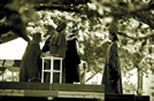
It’s a clear July Saturday morning, and on a grassy area just south of the Hesburgh Library reflecting pool, two young men practice the thrust and parry of swordplay. As I watch, a young woman in a long medieval gown accosts me. “Wouldst thou like a potion?” she asks, smiling, “a love potion?” I shake my head no. “Then perhaps,” she says, taking a critical look at me, “a beauty potion?”
Ah, yes, the revels are in full swing. It’s Summer Shakespeare at Notre Dame.
Lit major I was, but William Shakespeare never did much for me. By the time I finished checking the footnotes to figure out what in the Gehenna he was saying — “Ay, sir: I, a lost mutton, gave your letter to her, a laced mutton, and she, a laced mutton, gave me, a lost mutton, nothing for my labour” — the man who loved wordplay had me out of patience.
But earlier this July week, with Washington Hall’s main stage set for a professional production of Much Ado About Nothing, I checked out the nearby rehearsal hall where members of the second annual ShakeFest acting camp were preparing for their weekend outdoor performances of Macbeth and The Comedy of Errors. And the ShakeFest students, callow teens all, put my childhood lack of enthusiasm for the bard to shame.
“I think he was a brilliant playwright, and he’s really fun to act,” 14-year-old Kelsey Nash told me. “There’s so much hidden meaning behind it. You just can sort of get lost in the play.”
“The words that he used were just so elegant,” chimed in Rachel Hamburg, 13.
The ShakeFest students, under the direction of camp manager Jewel Abram-Copenhaver, have spent two weeks preparing for their outdoor performances of the two plays. While I thought I had it rough just reading Shakespeare in high school, the student actors have double the task. Not only must they figure out what he was saying, they must also figure out how best to convey those tricky words and emotions to an audience.
The afternoon I peek in, just a few days away from the weekend performances, the students are being guided through an understanding of their roles by Abram-Copenhaver and Sara Farren, the assistant director.
In one writing exercise, Abram-Copenhaver asks the 19 camp members to consider the character they’ve been assigned as a living person. “How old is your character?” she asks. “What are four main qualities that make up your character’s personality? Who do they like; who don’t they like?”
Later, she asks, “How are you going to help the audience understand what you’re saying?” Tone, pauses and actions are all important, she points out, then stresses that the actors must always stay in character while on stage.
But Abram-Copenhaver finds her advice upstaged whenever a professional actor with the Much Ado cast voluntarily drops by to lend the students moral and professional support. “They tell them the same things I do,” she confides later. “But the kids listen to them.”
On this day, R. John Roberts (that’s his professional name, otherwise he answers to Richard) stops by. He’s playing Leonato in the Much Ado About Nothing production, but this day he’s volunteered to help the lead Macbeth actors with their soliloquies. “What is the primary emotion here?” he asks Lewis Jordan, who stands on a makeshift stage in his role as Macbeth, bemoaning the death of his wife. “He’s had a really bad day,” the young actor tosses out with a grin.
Through the lighthearted banter, it is clear that for these students Shakespeare has become far more than words on a page. They now see their characters as actual living beings with all-too-human motivations.
“They’re plays about medieval times, but they’re still pertinent,” Erin Lewis, 16, told me. Lady Macbeth, a role Erin is playing, has a desire for power that people still display, she commented, “although I hope not in the same manner — with murder.”
With all the lively activity, including students fixing up their costumes, practicing swordplay, doing voice exercises and generally behaving like happy campers, the play is always the thing. “Paul Rathburn always says they were meant to be heard and performed,” says Roberts of Shakespeare’s work. Rathburn is the professor who launched the Summer Shakespeare Festival. And the festival itself is just one part of a huge plan called the Shakespeare Initiative, a plan designed to make Notre Dame the year-round home for both theatrical and scholarly Shakespearean work.
So I happily do my part to join in the homage to Shakeapeare. On that July Saturday morning I watch as the ShakeFest students perform abridged versions of first Macbeth and then The Comedy of Errors. And on Sunday afternoon, I watch as professional actors perform Much Ado About Nothing. In September, I will watch as the Actors From the London Stage, a Notre Dame-based international touring company, present A Midsummer Night’s Dream here, and I’ll be in the audience again when they return in February to perform Macbeth. And next year, the Summer Shakespeare Festival will be back, evolving and growing.
A weekend of three plays later, I am fully sold on welcoming Shakespeare to campus as a permanent object for both study and fun. Love, lust, hatred, desire, clowns, fools, kings and drunks — and words that even 400 years after they were written still have academics arguing and actors declaiming. In The Tempest, Shakespeare wrote, “All our revels now are ended.” Notre Dame hopes they’re just beginning.
Carol Schaal is the managing editor of this magazine.